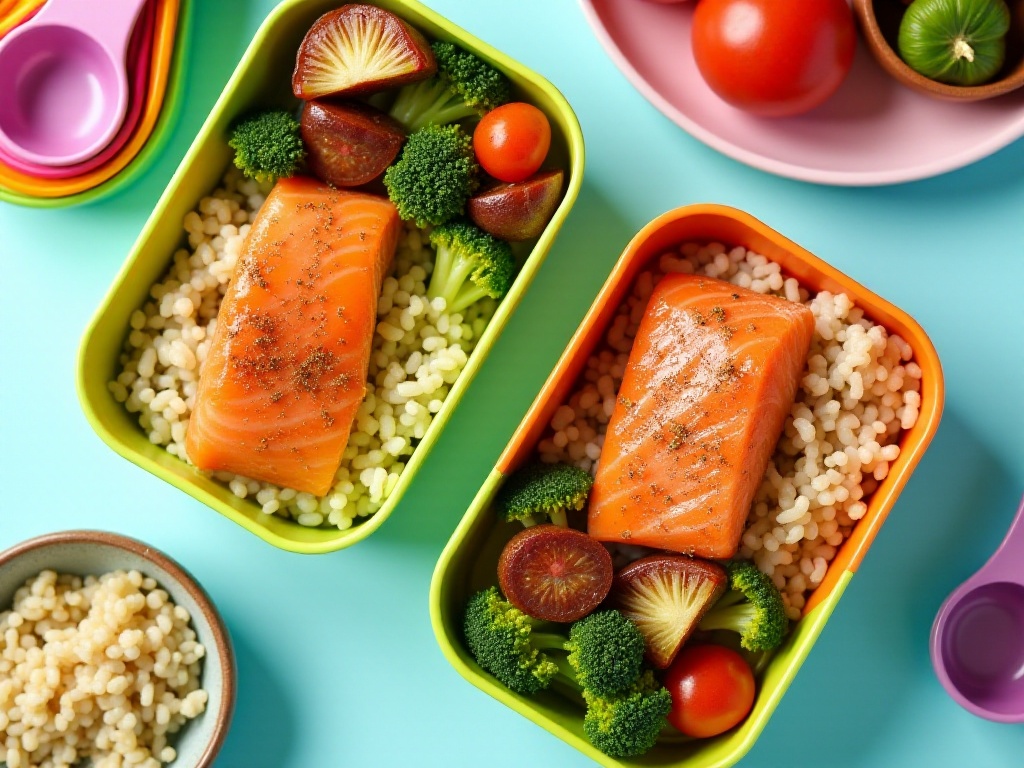Opening Thoughts
Hello everyone! I'm Little K, a recent addition to the workforce. I've been receiving many messages lately from friends asking about improving eating habits. Honestly, I totally understand this struggle! I used to be a typical "junk food collector," having jianbing (Chinese crepes) or meat sandwiches for breakfast, surviving on takeout for lunch, and ending the day with BBQ skewers to destress. It wasn't until last year's physical examination gave me a shock (high blood pressure, elevated transaminase, and abnormal blood lipids) that I realized: if I continued like this, my body might give up on me!
After three months of tough exploration and strict implementation, I finally found a healthy eating plan that works for me. Today I'd like to share my journey and specific practices, hoping to help those who are also struggling with their diet!
Breakfast Revolution
When it comes to breakfast, I have so much to say! Did you know? Harvard School of Public Health conducted a 16-year tracking study, finding that people who eat breakfast regularly have a 27% lower risk of heart disease compared to those who skip breakfast! This statistic shocked me because I used to be one of those "10 extra minutes of sleep is more important than breakfast" people.
But honestly, change doesn't happen overnight. When I first started changing, I began with the simplest thing. In the first week, I set just one small goal: making a cup of oat milk. That's it! Making oat milk is really quick, it only takes two minutes. After I got used to this rhythm, I slowly started adding ingredients: a banana today, some blueberries tomorrow, sprinkle some almond slices the next day...
Now my breakfast has evolved to a new level: a bowl of rye flakes (rye flakes are more nutritious than white oats, with higher dietary fiber content), topped with sliced banana (for potassium and satiety), plus a handful of blueberries (antioxidant powerhouse), and finished with a sprinkle of almond slices (for protein and healthy fats). For drinks, I choose homemade soy milk because commercial soy milk tends to be high in sugar.
The entire breakfast preparation time is neither long nor short, about 10 minutes. But the results are amazing! Now I'm energetic every morning, and no longer experience the morning drowsiness and lack of concentration I used to have. I've also noticed that after having a healthy breakfast, my food choices throughout the day unconsciously become healthier, as if setting a healthy tone for the day.

Ingredient Management
Managing ingredients is absolutely crucial for healthy eating! I learned these lessons the hard way.
First, let me talk about my "weekend shopping method." I used to buy things randomly as I thought of them, often ending up with unused ingredients that would spoil in the fridge. Now I dedicate two hours every weekend to shop at the fresh market or supermarket for next week's ingredients.
Before going to the supermarket, I check what's left in my fridge and make a detailed shopping list. This list isn't random; it's based on next week's work schedule and meal plans. For example, if I have to work overtime next week, I'll buy more easily preserved ingredients like root vegetables and storage fruits.
Research shows that planned shopping can reduce impulse buying by 40%. I can totally relate to this! Now I no longer go crazy buying snacks just because they're on sale, and I can actually use everything I buy.
When it comes to fridge management, I have quite a few tricks. First, I've divided my fridge into zones: the most visible spot is for cut fruits and vegetables, so healthy choices are the first thing I see when opening the fridge. On weekends, I wash and cut durable vegetables like carrots and celery, storing them in transparent containers. This not only saves time but more importantly, when you're hungry and looking for food, these healthy choices are right there, so you naturally won't go searching for snacks.
With this method, my snack calorie intake has dropped by 60%! I've also found that when your fridge is always stocked with fresh fruits and vegetables, your eating habits naturally become healthier. Now I snack on pre-cut fruit during lunch breaks - it satisfies cravings and is healthy. My colleagues say I'm very disciplined, but I've just made the healthy choice easier.

Smart Eating Methods
Speaking of eating methods, this is truly a science! I used to be a typical "wolf it down" type, finishing a meal in ten minutes, still feeling hungry, but then feeling extremely full shortly after. Later, I learned about the "20-20 rule" at a nutrition lecture, which really changed my eating habits.
Specifically: chew each bite 20 times and spend at least 20 minutes on each meal. When I first started, I found it extremely difficult because I wasn't used to chewing slowly. But! Let me share an interesting trick: I play music I like while eating and use the rhythm to control my eating speed. For example, if a song is about 4 minutes long, I set myself a goal to finish the meal over the duration of 5 songs.
The benefits of eating slowly are numerous! Research data shows that slow eaters have a 42% lower chance of being overweight compared to fast eaters. Why? Because our brain needs about 20 minutes to receive the "full" signal. If you eat too quickly, you might overeat before your brain can react.
Moreover, I've found that when you really start to taste each bite of food, your perception of food becomes more acute. Now I can clearly distinguish different ingredients' flavors and am more aware of feeling full. This not only helps control portion sizes but also allows you to truly enjoy the pleasure of eating.

Storage Wisdom
Food storage is really a big science! I've found that many people (including my former self) make quite a few mistakes in this area. For example, did you know that bananas shouldn't be stored with other fruits? Because bananas release ethylene gas, which speeds up the ripening of other fruits. When I first learned about this, I was amazed - this explained why all my fruits would spoil within days when I used to buy them in bulk!
After several months of exploration, I've developed a quite practical storage system. Let's start with leafy greens, which is really important because they spoil the easiest. My current method is: first absorb the moisture from the leaves with kitchen paper (moisture is a breeding ground for bacteria), then loosely wrap them in preservation bags, making sure not to tie them too tight, leaving some "breathing room" for the vegetables. With this treatment, leafy greens can last 3-4 extra days while staying crisp and tender.
Carrot storage also has its tricks. I cut carrots into small pieces and store them in containers with some clean water. This not only keeps carrots crisp but also prevents them from becoming soft or shriveled. With this method, carrots can maintain their fresh texture for a week.
Oh, and here's a special discovery I think is worth sharing: nuts are best stored in the refrigerator! Because nuts contain lots of unsaturated fatty acids, they easily oxidize at room temperature. Refrigeration not only extends their shelf life but also preserves their nutritional content. Now whenever I buy nuts, I immediately divide them into sealed jars and store them in the fridge.
These storage methods may seem simple, but they can really save you money. Since I started storing ingredients properly, their utilization rate has increased significantly, and there's almost no waste due to improper storage anymore.

Sustained Motivation
To be honest, the hardest part about changing eating habits isn't starting, but persisting. At first, I was full of enthusiasm, thinking I could instantly become a super healthy person. But as time went by, this enthusiasm gradually faded, and I started to wonder: is this really worth it?
After repeated exploration, I found two particularly effective methods: recording and rewarding. First, about recording - I downloaded a food tracking app on my phone and record everything I eat every day. This process might seem troublesome, but it's actually quite interesting. Through recording, I can clearly see my progress: from initially being dominated by junk food to now having a balanced diet; from frequent overeating to now maintaining appropriate portions.
Research data shows that people who consistently record their diet are twice as likely to succeed in weight loss compared to others. Why is this? I think it's mainly because recording makes us more aware of what we're eating and helps us identify problems in our diet. For example, through recording, I discovered that I tend to eat sweets when I'm stressed, and knowing this, I can consciously adjust.
As for the reward system, my approach is: after sticking to healthy eating for a week, I reward myself with a nice meal. Note that this doesn't mean junk food, but rather healthy ingredients that I usually consider too expensive, like salmon, avocados, or various berries. Such rewards satisfy cravings without undermining the results of healthy eating.
However, I want to emphasize one point: don't put too much pressure on yourself! This isn't a short-term competition but a habit to cultivate for life. It's okay to slip up occasionally; what's important is getting back on track promptly. I often remind myself: be gentle with yourself, take it slow, and things will keep getting better.

Closing Thoughts and Future Outlook
Looking back at these three months of changes, it feels truly amazing. Not only have I lost 5 kilos, more importantly, I feel like a different person altogether. Now I'm full of energy, my work efficiency has improved, my skin condition is better, and even my mood has become more positive and sunny.
But I know this is just the beginning. Healthy eating isn't a one-time thing but a lifelong journey requiring continuous effort. It's like planting a tree - you might not see obvious results from your initial time and effort, but if you persist, it will eventually grow into a towering tree, sheltering you from wind and rain.
Finally, I really want to say that everyone's physique and lifestyle are different, and no single diet plan suits everyone. What's important is finding what works for you and sticking to it. I hope my shared experiences can give you some inspiration, and I look forward to hearing your stories.
Next time, I plan to share some quick healthy recipes especially suitable for office workers, since time is precious for us working people. If you're interested, remember to follow me! Let's encourage each other and progress together on this journey to health!
PS: Do you have any unique healthy eating tips? Feel free to share them in the comments - your experience might help other friends!







